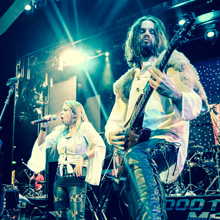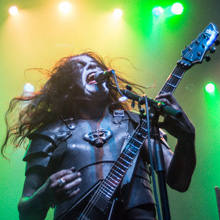- Posted By: Dark Emperor
- Comments: 0

IQ has a great trayectory in the Progressive Rock scene that spans over 28 years, 2009 marks the release yera of their 9th studio album. Peter Nicholls took some minutes off his busy day to answer our questions:
Thanks for taking time to answer our questions, and let’s get started:
The band has been around for 28 years and “Frequency” is ‘only’ the 9th full length studio album in the band’s career. Why only release 9 full length albums in all these years?
PN: Well, that’s an average of a new studio album about once every three years, which I think is a pretty good average. My feeling has always been that it’s much better to release a great album once every four or five years rather than an okay one every couple of years because the albums are the legacy we’ll leave behind, they’re by far the most important part of what we do as a band, so each one has to be as good as we can possibly make it, and that takes time. But in addition to the studio albums, we’ve also released several compilation CDs and live DVDs, all of which require a lot of time and work to prepare.
What has happened with the band since the release of “Dark Matter” in 2004 that lead to the release of “Frequency” in 2009?
PN: The last five years have seen quite a lot of upheaval in IQ. Drummer Paul Cook left in 2005, followed by Martin Orford in 2007 so it’s been a pretty turbulent period for us. ‘Frequency’ is the first IQ album to feature Andy Edwards on drums and Mark Westworth on keyboards, both of whom make a great contribution, I think. In addition to that, not long after Martin left the band I was taken into hospital with pneumonia and that brought everything to a halt for several months. I had a long period of convalescence before we resumed work on the album and Mike and I worked more closely together on this one than we have done in some time, which I found very rewarding and enjoyable. Andy has taken time off from IQ for personal reasons, so we’re very happy to have Paul Cook back with us.
How do you expect that fans of the band will react and receive “Frequency”?
PN: This album has had an extremely positive reaction from fans and critics alike and I have to say I think it’s our best work in a long while, despite everything that was potentially going against it. But we were determined to get through all the adversity and come up with something special, which we’ve definitely done.
What is the concept behind the current album? (If no concept please talk about the lyrics.)
PN: There isn’t a single concept behind the album, the lyrics deal with many topics. I started writing the lyrics when we were all in the rehearsal room improvising ideas. As always, I began singing sounds, anything to help me get a feel for a vocal melody and then I worked on refining the lyrics by myself. I’m always pretty slow when it comes to writing the words and they go through many, many changes until I end up with something I’m happy with, but I’m pleased with the lyrics on this album.
Any extensive touring planned to support “Frequency”, or just a select few dates like in previous years?
PN: We don’t play a huge amount of live shows these days so there won’t be an extensive tour to promote the album. We’ve already played in Europe earlier this year when the album was released, and we’ll return in September. Plus, there’s an American date in August and there will be UK dates in the autumn.
How does the songwriting happens within the ranks of IQ?
PN: The way it always has, with people bringing in ideas and riffs which we play through together until we end up with the bones of a song which we can then develop and flesh out. It’s important that everyone in the band feels they’re able to contribute to the music, we’ve always preferred it to be a group effort. I’ve always written the lyrics, and they happen once the music is nailed down

What do you think about the current status of progressive rock? As other bands have been pointing out do you think the genre is making a comeback? Why do you think people are paying more attention to this type of music these days?
PN: There does seem to be a resurgence of interest at the moment, with TV documentaries and magazines appearing. I’ve really no idea why the tide should be turning now but it’s a very welcome change of circumstances. Let’s hope it continues for many years. I seem to have spent the best part of thirty years defending progressive music.
How have your musical influences changed over the years? Do you guys listen to any of the new bands, or just enjoy the old classics? What is on your current play list?
PN: Personally, I’m not at all familiar with the new bands. That’s partly a deliberate decision because I don’t want to be influenced, even subconsciously, by what other bands are doing, but I also have to say that progressive rock isn’t always my first choice when it comes to listening to music. I like some of the ‘classic’ bands but not all of them, by any means. Currently I’m listening to The Killers, Tori Amos, Placebo, The Feeling and some Genesis bootlegs.
From all your tours and gigs what has been the most memorable show you have played and why?
PN: Very difficult to choose just one but we always loved playing at The Marquee in London in the early days. That was a very exciting time to be in a band. I have very vivid memories of playing Hammersmith Odeon in 1985, when we were supporting Wishbone Ash. That felt like a very significant step forward for us. And I really enjoyed performing the ‘Subterranea’ show, it was great to be a part of that.
If you guys would have an unlimited budget for a live performance what would you pick and why?
PN: It would be very tempting to re-stage ‘Subterranea’ with the latest technology. When we originally did it in 1997 it was quite primitive in comparison with what we could do nowadays.
Thanks for the interview, is there anything else you want to add for our readers?
PN: Thanks to everyone who has supported us over the years. I suppose we need to start planning for our 30th anniversary in 2011!






















